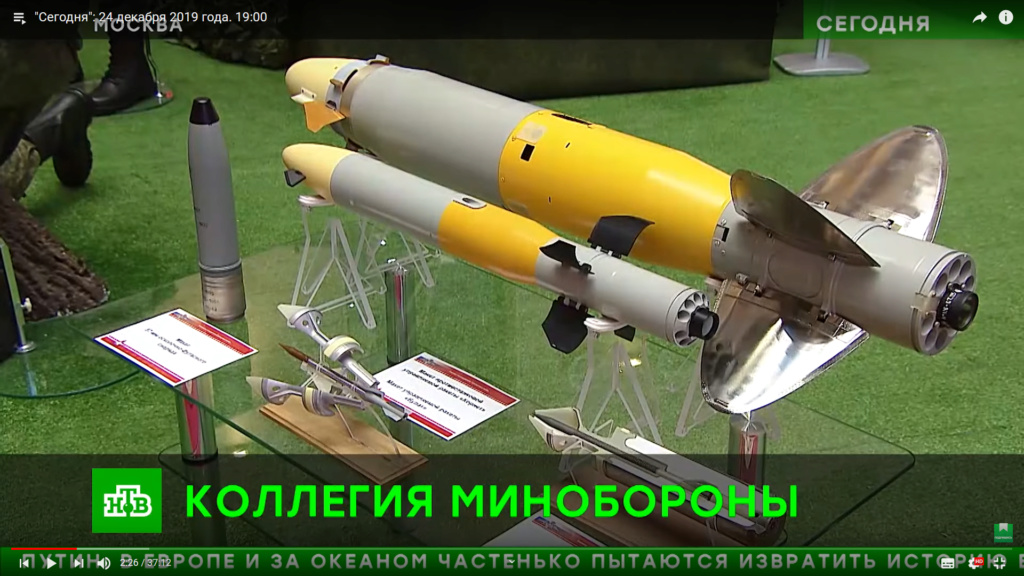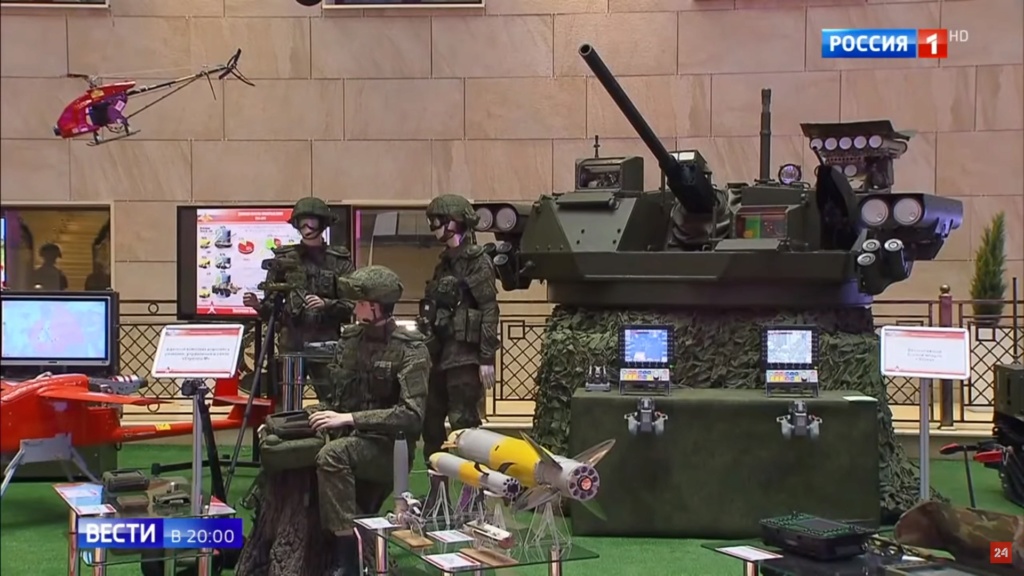+86
thegopnik
marcellogo
Begome
LMFS
PhSt
Tsavo Lion
tomazy
Walther von Oldenburg
0nillie0
william.boutros
dino00
Sprut-B
The-thing-next-door
Hole
Big_Gazza
Ives
Anonymous Fighter
George1
Project Canada
littlerabbit
KiloGolf
d_taddei2
T-47
franco
Kimppis
eehnie
Isos
nomadski
Benya
cheesfactory
SeigSoloyvov
miketheterrible
VladimirSahin
par far
a-andreich
Ned86
archangelski
max steel
Khepesh
Mak Sime
sepheronx
OminousSpudd
JohninMK
higurashihougi
Cplnew83
Cyberspec
PapaDragon
flamming_python
Book.
GunshipDemocracy
Flanky
sheytanelkebir
collegeboy16
KoTeMoRe
partizan
Werewolf
ult
ali.a.r
Kyo
victor1985
vuxel
Stealthflanker
nemrod
TheArmenian
medo
Zivo
KomissarBojanchev
TR1
Trexonian
GarryB
magnumcromagnon
Morpheus Eberhardt
AlfaT8
kvs
Djoka
Asf
Vympel
Mindstorm
Vann7
Viktor
Regular
acatomic
Cpt Caz
zg18
Mike E
Austin
90 posters
Russian Ground Forces: News #2

par far- Posts : 3496
Points : 3741
Join date : 2014-06-26
- Post n°826
 Re: Russian Ground Forces: News #2
Re: Russian Ground Forces: News #2
I was comparing Russian soldiers and US soldiers, the one thing I saw was that, the US soliders all had sights on their rifles but the Russian soldiers did not, why is that?

GarryB- Posts : 40573
Points : 41075
Join date : 2010-03-30
Location : New Zealand
- Post n°827
 Re: Russian Ground Forces: News #2
Re: Russian Ground Forces: News #2
Because US soldiers and the US army seem fixated with believing their assault rifles are sniper rifles and that if they can shoot people at 600m or 800m they will be safe from any return fire.
Of course as shown in Afghanistan... when you come up against an experienced military force they will recognise you superior short range fire power and try to work around it... in this case a group of foreign soldiers on foot patrol... set up a Kalashnikov 900m away and fire bursts at them and they wont have much on hand that can effectively return fire. Fire a few bursts and then move to a new position and fire some more and then move again.
Would also ask about which soldiers you are comparing... Russian soldiers in Syria all seem to have some form of optic on their weapons...
Of course as shown in Afghanistan... when you come up against an experienced military force they will recognise you superior short range fire power and try to work around it... in this case a group of foreign soldiers on foot patrol... set up a Kalashnikov 900m away and fire bursts at them and they wont have much on hand that can effectively return fire. Fire a few bursts and then move to a new position and fire some more and then move again.
Would also ask about which soldiers you are comparing... Russian soldiers in Syria all seem to have some form of optic on their weapons...

par far- Posts : 3496
Points : 3741
Join date : 2014-06-26
- Post n°828
 Re: Russian Ground Forces: News #2
Re: Russian Ground Forces: News #2
GarryB wrote:Because US soldiers and the US army seem fixated with believing their assault rifles are sniper rifles and that if they can shoot people at 600m or 800m they will be safe from any return fire.
Of course as shown in Afghanistan... when you come up against an experienced military force they will recognise you superior short range fire power and try to work around it... in this case a group of foreign soldiers on foot patrol... set up a Kalashnikov 900m away and fire bursts at them and they wont have much on hand that can effectively return fire. Fire a few bursts and then move to a new position and fire some more and then move again.
Would also ask about which soldiers you are comparing... Russian soldiers in Syria all seem to have some form of optic on their weapons...
Thanks for the reply GarryB, this was just a general comparison, I was looking through pictures.

GarryB- Posts : 40573
Points : 41075
Join date : 2010-03-30
Location : New Zealand
- Post n°829
 Re: Russian Ground Forces: News #2
Re: Russian Ground Forces: News #2
Optics certainly make shooting easier... a simple red dot sight eliminates a lot of errors in shooting, like not getting your head in to the correct position before firing, and also give you a much better view of the target.
For those not familiar with firearms, when you shoot a rifle at a target with iron sights the human eye cannot focus on all three elements that are important.
Basically you position your head on the rifle stock so you are looking through the rear sight at the front sight... the front sight shows you where your bullets are going to go, so you focus on your front sight and place that sharp clear front sight on the fuzzy indistinct blob that is the target.
When using optical sights the crosshair is sharp and clear and so is the target so you can actually pick a part of the target to aim for.
When using iron sights you generally aim centre of mass.
For all the western whinging and whining about the 7.62x39mm calibre AKs accuracy, because of the trajectory of the round you could set the iron sights to 300m and aim for the centre of the chest of the target. No matter what range the target appears you should get a hit on target... if the person is 50m away you will get a hit slightly high... it will be at its highest at about 100-150m where it will probably hit the target in the head, and then it will start to hit lower and lower until you get to 300m where it should hit centre of chest area. The bullet has rapidly slowed down so by 400m it will be a groin hit or leg hit, but if the target is 400m away you will realise it is a long way away and you could compensate by aiming at the head of the target so the bullet drop will result in a chest or gut hit.
To improve performance I always thought about loading 100 grain bullets and seeing if I could get higher velocities and flatter trajectories with that round, but I never got round to it. It was designed for combat distances of up to 300m or so and for that it works fine.
For those not familiar with firearms, when you shoot a rifle at a target with iron sights the human eye cannot focus on all three elements that are important.
Basically you position your head on the rifle stock so you are looking through the rear sight at the front sight... the front sight shows you where your bullets are going to go, so you focus on your front sight and place that sharp clear front sight on the fuzzy indistinct blob that is the target.
When using optical sights the crosshair is sharp and clear and so is the target so you can actually pick a part of the target to aim for.
When using iron sights you generally aim centre of mass.
For all the western whinging and whining about the 7.62x39mm calibre AKs accuracy, because of the trajectory of the round you could set the iron sights to 300m and aim for the centre of the chest of the target. No matter what range the target appears you should get a hit on target... if the person is 50m away you will get a hit slightly high... it will be at its highest at about 100-150m where it will probably hit the target in the head, and then it will start to hit lower and lower until you get to 300m where it should hit centre of chest area. The bullet has rapidly slowed down so by 400m it will be a groin hit or leg hit, but if the target is 400m away you will realise it is a long way away and you could compensate by aiming at the head of the target so the bullet drop will result in a chest or gut hit.
To improve performance I always thought about loading 100 grain bullets and seeing if I could get higher velocities and flatter trajectories with that round, but I never got round to it. It was designed for combat distances of up to 300m or so and for that it works fine.

miketheterrible- Posts : 7383
Points : 7341
Join date : 2016-11-06
- Post n°830
 Re: Russian Ground Forces: News #2
Re: Russian Ground Forces: News #2
par far wrote:GarryB wrote:Because US soldiers and the US army seem fixated with believing their assault rifles are sniper rifles and that if they can shoot people at 600m or 800m they will be safe from any return fire.
Of course as shown in Afghanistan... when you come up against an experienced military force they will recognise you superior short range fire power and try to work around it... in this case a group of foreign soldiers on foot patrol... set up a Kalashnikov 900m away and fire bursts at them and they wont have much on hand that can effectively return fire. Fire a few bursts and then move to a new position and fire some more and then move again.
Would also ask about which soldiers you are comparing... Russian soldiers in Syria all seem to have some form of optic on their weapons...
Thanks for the reply GarryB, this was just a general comparison, I was looking through pictures.
Every Russian soldier gets a kit which has some form of optics. Sometimes old Soviet optics. Sometimes newer stuff. May depend on the department you are in

GarryB- Posts : 40573
Points : 41075
Join date : 2010-03-30
Location : New Zealand
- Post n°831
 Re: Russian Ground Forces: News #2
Re: Russian Ground Forces: News #2
Every Russian soldier gets a kit which has some form of optics. Sometimes old Soviet optics. Sometimes newer stuff. May depend on the department you are in
AFAIK Ratnik includes a night vision monocular that can be attached to a head harness, or can attached to a rifle in front of a standard optical sight to give night vision capability.
Ratnik II is currently standard issue and they hope to get Ratnik III into service by about 2022.
Until recently, these multiple launch rocket systems were armed only with army artillery brigades. But in the near future, the latest modular MLRS Uragan-M1 will displace them from artillery brigades, which, unlike their predecessors in the M1 arsenal, have a whole set of high-precision munitions. Due to the released “simple” “Hurricanes”, the firepower of artillery of motorized rifle and tank divisions will be significantly increased. Even a single battery of such MLRS is an impressive force that can create serious difficulties for the enemy.
So it sounds like new modular rocket launchers are going in to artillery brigades... which I assume will either operate independently or be attached to other force structures as required, but that the older systems they are replacing will be moved to infantry and tank brigades to boost their fire power.
The older systems get target information from the battle management system everyone uses, but the guns need to be aimed and the number of rounds fired is determined by the gun platform itself. On the newer systems it is all calculated at higher levels and the gun is automatically aimed... the vehicle crew just press the button to fire.
That stuff about towed guns offering better mobility is very interesting... especially where it states that even a wheeled artillery piece is not as mobile as a towed gun with truck prime mover... that is really not what I would have expected.
Eehnie was adamant that wheeled artillery and self propelled anti aircraft guns would replace all towed models like the ZU-23 and mortars and guns like the D-30 and 2A65. It seems experience has shown that towed models have features that much more expensive self propelled models can't match.
They are therefore looking at a towed model of Coalition... presumably to supplement the 2A65, but then they are looking at the D-30 again too.
Generally over time, a calibre becomes obsolete as artillery, because its targets get further away and better protected, so the range and shell weight needs to increase. The easiest way to increase the range and shell weight of a 122mm D-30 is to go for a larger calibre in the form of a 2A65 in 152mm calibre.
The D-30 is lighter and easier to move around the battlefield but has shorter range and a smaller lighter shell than the 2A65, which is based on the gun from the MSTA.
There was a new gun developed from memory based on the D-30 mount that was in a 152mm calibre but it didn't have the range of the 2A65 as it was a shorter barrel gun... perhaps their best upgrade path would be an upgraded 152mm calibre shorter gun on a D-30 mount for mobility and improve impact on target, while the 2A65 could be supplanted by a towed Coalition gun model to allow new ammo and extended range special rounds be used.
Should be interesting.

George1- Posts : 18528
Points : 19033
Join date : 2011-12-22
Location : Greece
- Post n°832
 Re: Russian Ground Forces: News #2
Re: Russian Ground Forces: News #2
Russia’s next-generation combat outfit to get latest ammunition and small arms
The Sotnik third-generation combat outfit is set to replace the Ratnik gear already in 2025
https://tass.com/defense/1090421
The Sotnik third-generation combat outfit is set to replace the Ratnik gear already in 2025
https://tass.com/defense/1090421

GarryB- Posts : 40573
Points : 41075
Join date : 2010-03-30
Location : New Zealand
- Post n°833
 Re: Russian Ground Forces: News #2
Re: Russian Ground Forces: News #2
In addition to the individual protection gear, it will include completely new munitions and small arms
Awesome... so new munitions and new fire arms... for Ratnik 3 called Sotnik.
So from what I can tell... Ratnik means Warrior, while Sotnik means Centurion... meaning Sentry rather than 100 years old...

flamming_python- Posts : 9561
Points : 9619
Join date : 2012-01-30
- Post n°834
 Re: Russian Ground Forces: News #2
Re: Russian Ground Forces: News #2
GarryB wrote:In addition to the individual protection gear, it will include completely new munitions and small arms
Awesome... so new munitions and new fire arms... for Ratnik 3 called Sotnik.
So from what I can tell... Ratnik means Warrior, while Sotnik means Centurion... meaning Sentry rather than 100 years old...
Ratnik was essentially a militiaman gathered by levy from among the peasent population in medieval times, and also during the Imperial era too when conscription became systemized; ratniks were the reservists of the 2nd and 3rd categories.
Sotnik is again a specifically Russian military term. The commander of a 100 men detachment, such those typically found in Streltsy and Cossack troops.
In form and function they were thus pretty much the same as that of early Roman Centurions; albeit the term Sotnik doesn't refer to Roman Centurions.

PhSt- Posts : 1494
Points : 1500
Join date : 2019-04-02
Location : Canada
- Post n°835
 Re: Russian Ground Forces: News #2
Re: Russian Ground Forces: News #2
Drones, robots, lasers, supersonic gliders & other high-tech arms: Putin wants Russian military to be up to any future challenge
The Russian military will be going all out sci-fi, with Vladimir Putin saying the plan for boosting the Armed Forces until 2033 should focus on AI and weapons based on ‘new physical principles.’
With the introduction of a whole range of state-of-the-art arms in recent years, Russia has been “able to make a step forward compared to the world’s other military powers,” Putin said during a meeting of the Russian Security Council on Friday.
The tally of the newest weapons and hardware in the possession of the country’s Armed Forces and Navy is currently over 68 percent, he said, adding that they must be increased to at least 70 percent and maintained at that level.
The program for the development of the Russian military-industrial complex until 2033 will be approved next year for Russia to remain ahead of its rivals, the President said.
The emphasis in the plan must be put on “advanced high-precision weapons and means of aerospace defense; the active use of artificial intelligence in the production of military hardware,” the President said.
Russia requires these futuristic arms because “the world is facing serious challenges and threats,” while military technologies are developing rapidly, providing for tougher competition in the area, Putin explained.
“The US withdrawal from the INF treaty [banning the US and Russia from fielding in Europe ground-based missiles with a range of between 500km and 5,500km] under an invented pretext has become a significant blow for the arms control system.” Russia must be able to forecast the effect that this move will have on the international situation and to adjust its military potential accordingly.
NATO's buildup near the Russian borders and “attempts to militarize space” are also a cause for significant concerns, the head of state said.
They’re in the army now
Russia has already successfully tested its Avangard hypersonic glider, which is launched by silo-based ICBMs. Some sources claim this technology is about to be put in service by the end of the year. Kinzhal hypersonic missiles, which are fired from aircraft, have also been shown to the public. Those weapons are said to be able to bypass any existing air defences, due to traveling five times faster than the speed of sound. Work on the ship-based Zircon hypersonic system is currently underway.
One of the weapons, based on new physical principles, is the Peresvet laser system, which began trials with the military last year. The hardware is highly classified, but experts believe it can be used as a jamming device or to neutralize enemy targets, including cruise missiles and satellites in orbit.
The assembly of serial Su-57 fifth generation fighter jets began earlier this year. The cutting-edge aircraft actively employs AI and was even described as “a flying robot.” A few months ago, a trial version of Su-57 performed a spectacular joint flight with Russia’s new Okhotnik heavy drone, with can be used for both surveillance and attack missions.
https://www.rt.com/russia/474119-putin-laser-drone-robot-hypersonic/

flamming_python- Posts : 9561
Points : 9619
Join date : 2012-01-30
- Post n°836
 Russian Mines & Minelayers
Russian Mines & Minelayers
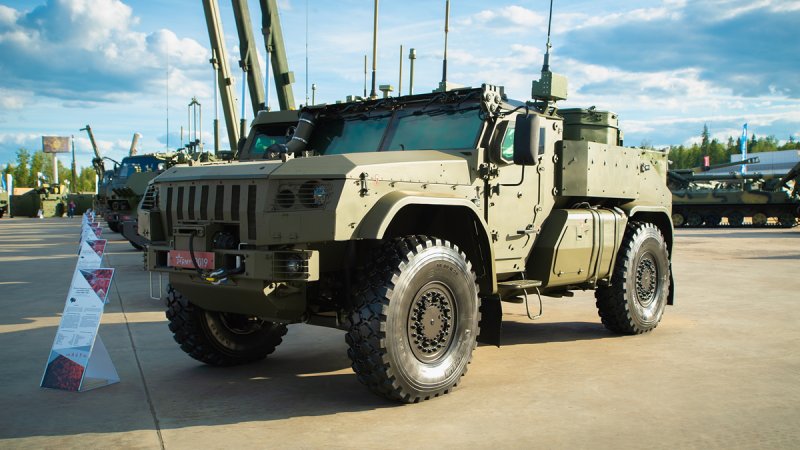
http://mil.today/2019/Science40/
Mine Hardware to Reach New Level in 2020's
Mines constitute a simple, though highly effective measure to gain advantage over the enemy. This is especially relates to the remote-planting devices allowing for rapid change of operational environment. The current trend is that mines and their planting facilities are getting more sophisticated, with increasing effectiveness and application flexibility. In 2020's, the works on development and commissioning of such systems will speed up, which is seen in Russia, the US and Europe.
Visitors of the Army-2019 forum had an opportunity to estimate the special mine-planting systems (SPEMPS) developed under the Klesch-G research project. The multirole minelayers can be mounted on tracked vehicle, on wheeled chassis of Astais-70202-0000310 or Typhoon-VDV armored rovers.
Apart from improved protection, the vehicles are equipped with an advanced geolocation system helping to plot detailed mining maps and send the online mine-planting data to superior command.
In the future, these minelayers, in addition to clusters of PFM-1 antipersonnel HE mines, POM-2 stake mines, and PTM-3 antitank mines, will plant the 'smart' POM-3 mines unveiled by the media in 2015. Using sensors, the mine detonates without direct contact with the enemy, reports Zvezda TV channel.
In December 2019, the Twelfth Central Research Institute of the Russian Defense Ministry is to complete preliminary tests of prototype samples of special mine-planting sets developed under the Klesch project. Along with that, the state trials of Typhoon-VDV rover, being the base for a multirole minelayer, come to the end.
A Russian lieutenant colonel, veteran of the counterterrorist operation at the North Caucasus and the Syrian campaign told in the face-to-face interview to Mil.Press Today that mounting of launchers on the said armored rovers increases mobility of systems and protection of crews, as compared to the old multirole minelayers based on the ZIL-131 trucks. As for the officer, such systems can be used for prompt closure of hazardous sectors, lateral protection of defending troops, and enemy's movement correction.
"If the scouts did a good job and learned about some enemy's action, it is a good chance for rapid consolidation. Another case, when you can direct the enemy wherever it is planned. If the route of the enemy's troops is known, the recon unit may call for a minelayer and mine the certain terrain sector. You can block the planned route or close the retreat lines, if it was decided to set an ambush", explained the veteran.
In addition, the officer told about how effective the minelayers are: "I had a chance of seeing these systems in action. Fragmentation mine POM-2 impresses much. First, the mines are thrown, and then they shoot wired target sensors. What we finally get is a tripwire, making lots of troubles for the enemy. There's plenty of such mines on the area, so the enemy's personnel won't be very anxious to clear the field. Sure, POM-2 mines make no harm to armor, but for that purpose you can 'seed' antitank ones".
In designing of mines and planting systems, Russian military and industry have vast room for maneuver, as Russia did not joined the Convention on the Prohibition of the Use, Stockpiling, Production and Transfer of Anti-Personnel Mines and on Their Destruction (a.k.a. Ottawa Treaty).
Neither did the US, though in 2014 the then-president Barack Obama announced a new policy regarding the anti-personnel landmines. According to the fact sheet, the United States planned to halt production and procurement of anti-personnel mines. It was also announced that the national armed forces waived the use of all "non-detectable" and "persistent" mines.
However, the US authorities admit that using mines helps to gain advantage over the enemy at the battlefield. It is especially relates to the systems analogous to Russian minelayers, known in the US Army as Volcano mine system.
The system's feature is that the used mines have a programmed operational term: 4 hours, 48 hours, or 15 days. This option enables coordination of the use of anti-personnel mines and the new American policy targeted at alignment with the Ottawa Treaty. However, the convention makes no exception for the 'temporary' mines though.
American military call Volcano systems obsolete but still relevant. Reports on their use for training and combat purposes occasionally emerge in official informational sources of the US Army.
Moreover, the system will see development. With this in view, the US defense budget for 2020 and 2021 fiscal years includes $20 mln allocated for creation of the Standoff Activated Volcano Obstacle (SAVO) system, a Volcano-based ground launcher postured as a measure for rapid obstruction to enemy's vehicles. The system will utilize smart technologies capable to fuse the mines without direct contact with the enemy.
Given that the SAVO launcher is based on Volcano system, it will be able to apply anti-personnel mines, too.
Advanced European mine-planting systems are to gain momentum in 2020's as well.
For instance, Poland, that ratified the Ottawa Treaty, by 2022 plans to obtain a prototype of home-made minelayer designed under BAOBAB-K project. The system is to be developed by Huta Stalowa Wola (HSW). The company has already offered its minelayer in the past, but it failed to meet the set requirements.
The development contract was signed by the Polish defense ministry's weaponry inspection. The tender was announced in 2017.
According to the specifications, the vehicle must have wheel arrangement 8x8, six launchers, armored cabin (level I ballistic protection under STANAG-4569), high-tech launch control system, laser radiation detector OBRA-3 linked to 81-mm smoke grenade launchers, loading equipment (launchers must be removable, with an option for a standard 20-feet container), and a combat module with 12.7-mm machinegun.
Reportedly, BAOBAB-K system will use only antitank mines.
Therefore, development of mine-planting hardware can be treated as the worldwide trend. In this area, with already available solutions on mine-protected chassis, Russia holds leading positions.

flamming_python- Posts : 9561
Points : 9619
Join date : 2012-01-30
- Post n°837
 Re: Russian Ground Forces: News #2
Re: Russian Ground Forces: News #2
Article from a year ago, don't know if we had this news already or not
http://mil.today/2018/Arctic3/
http://mil.today/2018/Arctic3/
Russian Military Wants Two-Section ARV for Arctic
Russian defense ministry has recently ordered designing of an armored recovery vehicle (ARV) for operation in Arctic. The tender for a corresponding R&D project was won by Uralvagonzavod, an insider in defense industry shared with Mil.Press Today.
"Indeed, the Arctic version of the ARV codenamed Evacuator GM will be designed by Uralvagonzavod. The vehicle will be ready by the end of 2020", explained the source.
Totally, 169.4 mln rubles will be allocated for the project, to be divided in three parts: in 2018 it is planned to grant 18.5 mln rubles, in 2019 – 148 mln rubles, and over 2.9 mln rubles in 2020.
Being interviewed by Mil.Press Today, a military expert Viktor Murakhovsky said it was too early to specify how the project would look like, though the creation of the arctic ARV was logical.
"Many efforts are applied to develop two-section hardware. The arctic force grouping has an air defense system, a transporter with combat module, and so. Naturally, this family needs technical maintenance vehicles", summed up the expert.
The new rover is designed for recovery of damaged military vehicles in arctic conditions, including under enemy fire, to disabled vehicle collecting points or shelters. Also, the ARV will be used for unditching operations and assistance to crews in repairs and maintenance in field conditions.
Uralvagonzavod has wide experience in designing of armored recovery vehicles. For instance, BREM-1M based on the T-72A tank chassis, armed with antiaircraft machinegun NSVT-12.7, and equipped with observation sensors for battlefield technical reconnaissance. The vehicle has a hydraulic crane and electric welding equipment to perform repair and maintenance in field conditions, a haulage winch to evacuate trapped tanks, and accessories for earthworks and bulldozing operations. Technical characteristics of the arctic version have not been disclosed so far.

Hole- Posts : 11132
Points : 11110
Join date : 2018-03-24
Age : 48
Location : Scholzistan
- Post n°838
 Re: Russian Ground Forces: News #2
Re: Russian Ground Forces: News #2

GarryB- Posts : 40573
Points : 41075
Join date : 2010-03-30
Location : New Zealand
- Post n°839
 Re: Russian Ground Forces: News #2
Re: Russian Ground Forces: News #2
Holy metal fragments batman... that top missile display shows what looks like a Kornet and next to it a mini Kornet... the Bulat shorter range ATGM they have developed... both missiles clearly used laser beam riding guidance.
Also on that table is a 57mm grenade round, plus an APFSDS round but that round at the front of the table bottom right is hard to make out... is that the proposed 45mm round or something else? It looks like an APFSDS round but is way to small to be the high velocity 57mm round.
The turret shows four Kornet missiles ready to fire plus Bulat missiles... I count 7 missile tubes on that launcher ready to fire, and what appears to be the 57mm grenade launcher and rifle calibre machine gun... nice looking set up.
With all those guided missiles enemy IFVS could be taken on with missiles so it does not need a high velocity 57mm gun with an APFSDS round to defeat IFVs... which is good news because the 57mm grenade launcher probably has a much more effective HE round than the high velocity 57mm gun.
The question is... will the IFVs have only 57mm grenade launchers and missiles or will some get 57mm high velocity guns too... or will the high velocity guns only be used for air defence vehicles and perhaps BMPT type vehicles...
All very interesting..
Also on that table is a 57mm grenade round, plus an APFSDS round but that round at the front of the table bottom right is hard to make out... is that the proposed 45mm round or something else? It looks like an APFSDS round but is way to small to be the high velocity 57mm round.
The turret shows four Kornet missiles ready to fire plus Bulat missiles... I count 7 missile tubes on that launcher ready to fire, and what appears to be the 57mm grenade launcher and rifle calibre machine gun... nice looking set up.
With all those guided missiles enemy IFVS could be taken on with missiles so it does not need a high velocity 57mm gun with an APFSDS round to defeat IFVs... which is good news because the 57mm grenade launcher probably has a much more effective HE round than the high velocity 57mm gun.
The question is... will the IFVs have only 57mm grenade launchers and missiles or will some get 57mm high velocity guns too... or will the high velocity guns only be used for air defence vehicles and perhaps BMPT type vehicles...
All very interesting..

Isos- Posts : 11605
Points : 11573
Join date : 2015-11-06
- Post n°840
 Re: Russian Ground Forces: News #2
Re: Russian Ground Forces: News #2
that round at the front of the table bottom right is hard to make out...
It is the same apfsds as the one next to it but with the cartridge.
The small kornet allows to attack and destroy any vehicle but tanks. So in 95% of cases it will do the work. And I count 8 of them, 1 is hidden behind the machine gun and you can see it partially.
The apfsds can take out any tank. Small size but high rate of fire allows to fire many shots in few seconds. The more you fire the more chances you have to go through weak spots even on the front of a M1A1 or take out its gund and optics.
Too bad the photograph didn't take a picture of the description. Every time they forget that.


Isos- Posts : 11605
Points : 11573
Join date : 2015-11-06
- Post n°841
 Re: Russian Ground Forces: News #2
Re: Russian Ground Forces: News #2
Google converter gives 812000$ at today's exchange rate. That's around 406$ the shell. I thought it was more expensive.
Rob Lee
@RALee85
·
3h
Bu August, the MoD is set to receive 2k 3BM44 Lekalo 125mm "super shells" produced by NIMI Bakhirev for its T-72, T-80, and T-90 tanks. They can penetrate 650mm of armor at a range of 2km (compared to 520mm for the 3BM42 Mango) with a max range of 3-5km.
Rob Lee
@RALee85
·
3h
The cost of the 2k shells is 51.5 million rubles, and the 3BM44 Lekalo differs from previous shells with its stronger core and 4Zh63 gunpowder charge. 2/
Rob Lee
@RALee85
·
3h
Bu August, the MoD is set to receive 2k 3BM44 Lekalo 125mm "super shells" produced by NIMI Bakhirev for its T-72, T-80, and T-90 tanks. They can penetrate 650mm of armor at a range of 2km (compared to 520mm for the 3BM42 Mango) with a max range of 3-5km.
Rob Lee
@RALee85
·
3h
The cost of the 2k shells is 51.5 million rubles, and the 3BM44 Lekalo differs from previous shells with its stronger core and 4Zh63 gunpowder charge. 2/

George1- Posts : 18528
Points : 19033
Join date : 2011-12-22
Location : Greece
- Post n°842
 Re: Russian Ground Forces: News #2
Re: Russian Ground Forces: News #2
The Russian Ministry of Defense has published a video of the Russian army’s training exercises in Molino Square of the Nizhny Novgorod Province.
The video shows the participation of T-72 tanks, Mi-24 helicopters and Mesta-SM-2 guns in the exercises.
According to the Russian Ministry of Defense, the Mi-24 chopper and T-72 tank were both recently updated to enhance their performance in battle.
The video released by the Russian Ministry of Defense shows the recently updated military hardware and their new capabilities.
The video shows the participation of T-72 tanks, Mi-24 helicopters and Mesta-SM-2 guns in the exercises.
According to the Russian Ministry of Defense, the Mi-24 chopper and T-72 tank were both recently updated to enhance their performance in battle.
The video released by the Russian Ministry of Defense shows the recently updated military hardware and their new capabilities.

JohninMK- Posts : 15669
Points : 15810
Join date : 2015-06-16
Location : England
- Post n°843
 Re: Russian Ground Forces: News #2
Re: Russian Ground Forces: News #2
Speed of removing them from storage didn't look to be an issue.
konrad Muzyka - Rochan Consulting
@konrad_muzyka
If you ever wondered what Russians are storing in newly built storage facilities in Crimea and elsewhere, here you have an example. 126th Independent Coastal Defence Brigade, Crimea.
https://twitter.com/konrad_muzyka/status/1253678925554868224/photo/2
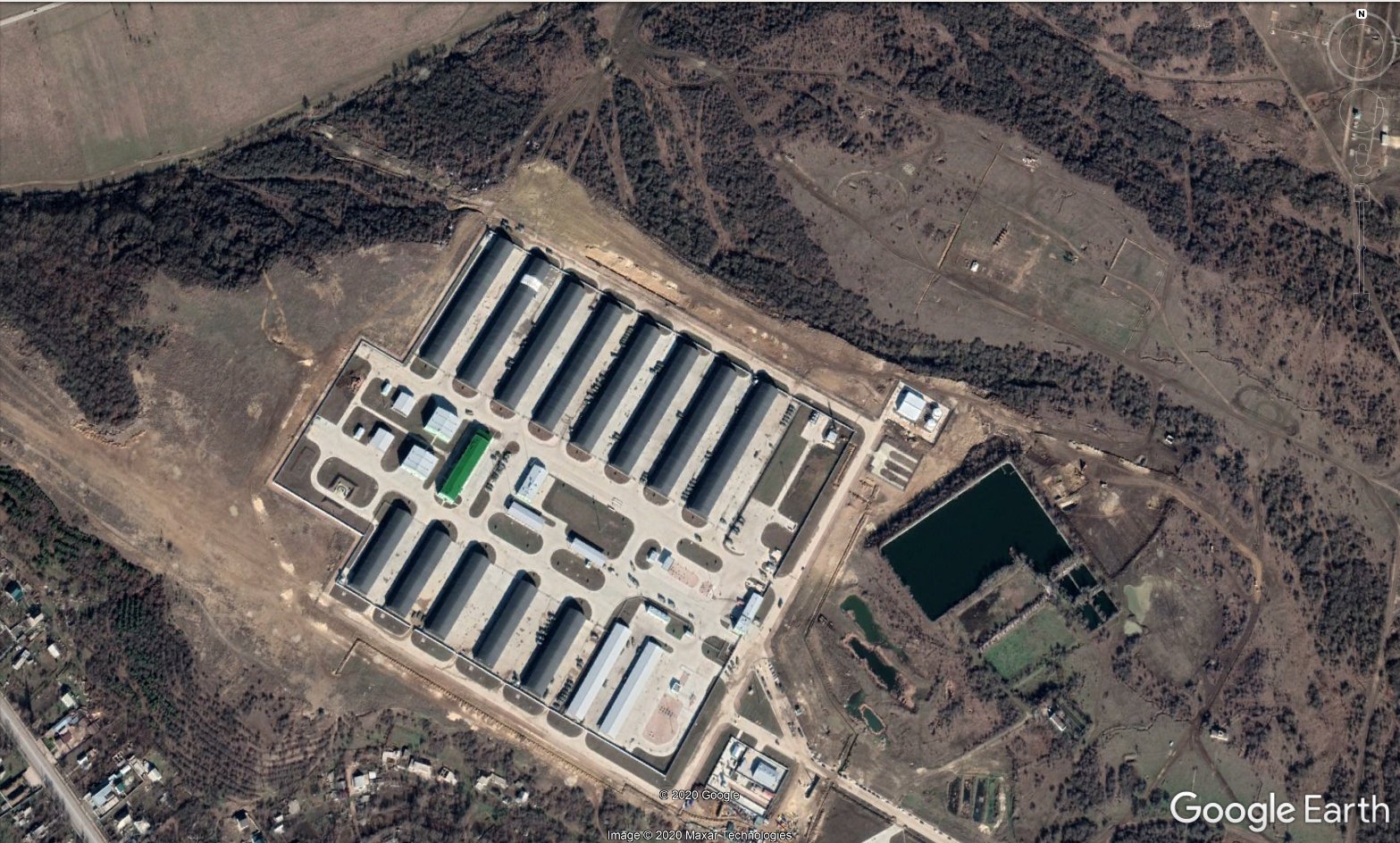
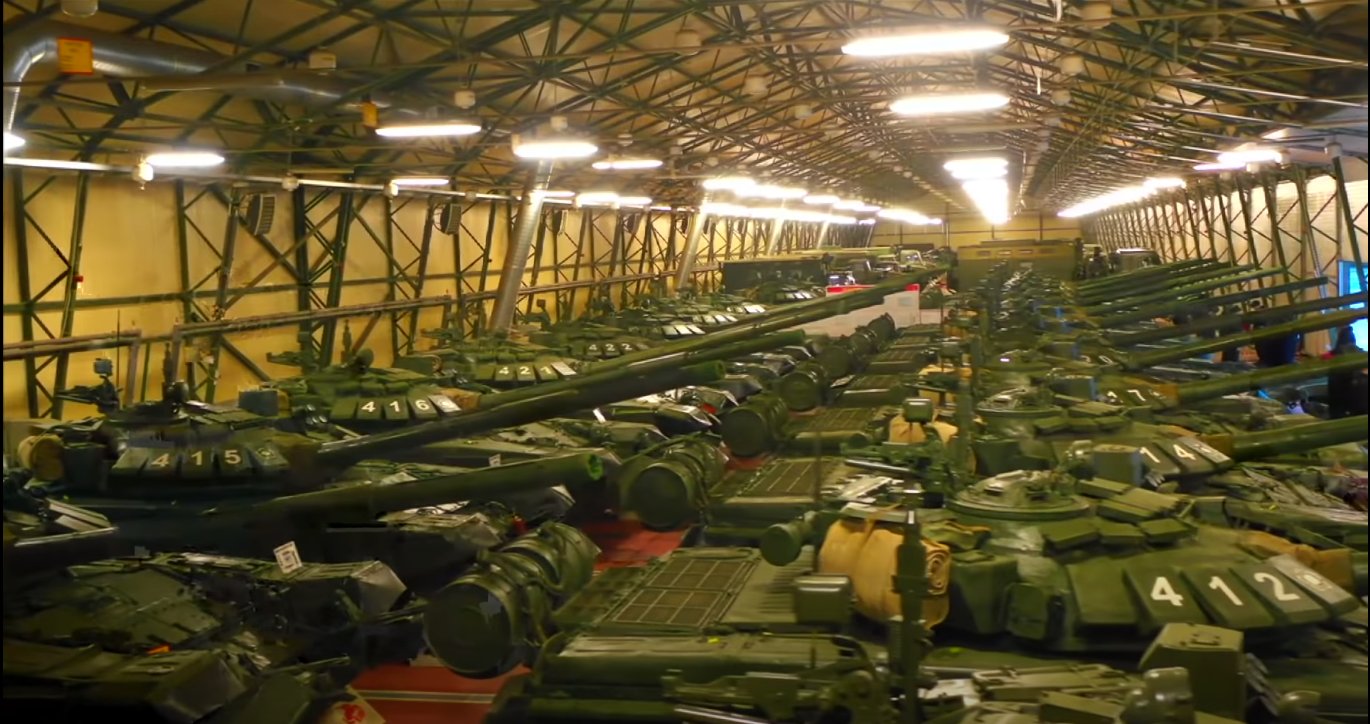
konrad Muzyka - Rochan Consulting
@konrad_muzyka
If you ever wondered what Russians are storing in newly built storage facilities in Crimea and elsewhere, here you have an example. 126th Independent Coastal Defence Brigade, Crimea.
https://twitter.com/konrad_muzyka/status/1253678925554868224/photo/2



Isos- Posts : 11605
Points : 11573
Join date : 2015-11-06
- Post n°844
 Re: Russian Ground Forces: News #2
Re: Russian Ground Forces: News #2
They shoukd be such simple protection shelter for every single jet on their airfields.

kvs- Posts : 15873
Points : 16008
Join date : 2014-09-11
Location : Turdope's Kanada
- Post n°845
 Re: Russian Ground Forces: News #2
Re: Russian Ground Forces: News #2
These structures need proper ventilation. They trap to moisture which is bad for tanks, jets and whatnot.

JohninMK- Posts : 15669
Points : 15810
Join date : 2015-06-16
Location : England
- Post n°846
 Re: Russian Ground Forces: News #2
Re: Russian Ground Forces: News #2
This one has it, the big tubes behind the lights.kvs wrote:These structures need proper ventilation. They trap to moisture which is bad for tanks, jets and whatnot.

GarryB- Posts : 40573
Points : 41075
Join date : 2010-03-30
Location : New Zealand
- Post n°847
 Re: Russian Ground Forces: News #2
Re: Russian Ground Forces: News #2
A dehumidifier would be better than ventilation because cold damp air from outside will condense on cold objects in a warmer room... like tanks made of metal...

PapaDragon- Posts : 13479
Points : 13519
Join date : 2015-04-26
Location : Fort Evil, Serbia
- Post n°848
 Re: Russian Ground Forces: News #2
Re: Russian Ground Forces: News #2
kvs wrote:These structures need proper ventilation. They trap to moisture which is bad for tanks, jets and whatnot.
I am pretty sure that there is waaaay more moisture outside during rain, snow, sleet, fog, mist, hale etc...

Regular- Posts : 3894
Points : 3868
Join date : 2013-03-10
Location : Ukrolovestan
- Post n°849
 Re: Russian Ground Forces: News #2
Re: Russian Ground Forces: News #2
JohninMK wrote:This one has it, the big tubes behind the lights.kvs wrote:These structures need proper ventilation. They trap to moisture which is bad for tanks, jets and whatnot.
By looking at the red/yellow sign it looks like it could be related to fire control systems.
But this place does have ventilation, even old soviet storages did have pressurised ventilation that didn't need big tubes.

Isos- Posts : 11605
Points : 11573
Join date : 2015-11-06
- Post n°850
 Re: Russian Ground Forces: News #2
Re: Russian Ground Forces: News #2
The crews can clean them every week to destroy any moisture with some vinegar. They are paid to serve and I doubt they always drive the tanks so lot of free time to take care of them.



